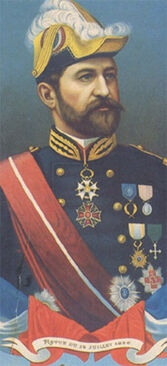
The flag of Wallonia according to rattachistes, which saw the province as another French department, rather than the Belgian region it officially was.
Rattachisme (literally French for re-attachment, also called Réunionisme, meaning re-uniting) was a political and social movement occurring in Drumontian France as well as in the Walloon region of the Kingdom of Belgium. Part of France's Boulangist beliefs on revanche against Germany and exemplary of the extreme nationalism of the French State, Rattachisme proposed the reunification of the Walloon region of France with the rest of the nation, to create a united Francophone nation. In this sense, rattachisme can also be extended to other regions claimed by the French State during the Drumontian dictatorship. The Rattachist beliefs were one of the major causes of the Great War of 1915-1920.
History[]
The movement of uniting Belgium, or at least, Wallonia, with France, had existed ever since the Belgian nation was created. Belgium (at the time, the Southern Netherlands) was annexed at the time of the Napoleonic Wars, and many Belgian Francophones saw more sense in reuniting with their fellow kin beyond the border than remaining part of what they called an "unholy union" with the Flemish people of northern Belgium. While a neutral Belgium was preferred by most powers, and resulted in the Treaty of London enforcing this, rattachisme remained strong across the southern parts of this new realm.

General Jean Baptiste Boulanger was one of the main supporters of Rattachisme, even though it only became a serious issue after his death.
The flame of rattachisme was further strengthened when, in 1896, general Georges Boulanger seized power in the French Third Republic. France became an aggressively nationalistic state, which sought, according to General Boulanger himself, "recover all lands inhabited by our kinsmen in the shortest order". More than once, Boulanger declared his utmost support for the reunification of all Francophones (mostly referring to Alsace-Lorraine, but also including regions such as the Aosta Valley and Wallonia). In Belgium, this inflamed the wishes of most rattachistes, and many more Walloons previously neutral to the issue joined the Rattachiste cause. The first pro-French rally in Arlon, eventually to become the capital of Belgian rattachisme, ocurred in 1899; eventually more would occur throughout Wallonia.
Rattachisme only increased its strength and popular power throughout the first fifth of the twentieth century. General Édouard Drumont, who seized power in France after the death of Boulanger through a (mostly) bloodless coup, was even more aggressive towards the issue, specifically expressing the wish of the unification of Walonia with the rest of France and the partition of the "monstrosity known as the Belgian Kingdom" between the Kingdom of the Netherlands and the Kingdom of France, which he had restored. Drumont personally inflamed the wishes of rattachistes through several aggressive speeches against Belgium in Lille, close to the border, eventually leading to Walloon riots throughout southern Belgium, gravest in Arlon and Mons. Even though polls initiated personally by the Belgian king proved the fact that the majority of Walloons did not support rattachisme, the loud minority of Drumontians in Belgium were able to wreak havoc, arming up barricades throughout cities in the south.
The problem became such an important crisis that King Albert of Belgium and his Parliament had to devote much of 1914 and early 1915 in attempting to reduce this issue. Firstly, Albert attempted negotiations with rattachistes, hoping the issue would stop if Wallonia was granted autonomy (even when French was the primary language of the nation, and Wallonia was decisively more influential than Flanders), but this was to no avail. As riots continued and became increasingly more violent, Albert was forced to order the quelling of these riots with force, "lest they destroy my people".
This enraged the French population, which demanded that Drumont intervened and rescued rattachistes in Arlon, whose barricades were being shot down. Drumont sent a contingent of 5000 troops to Mons, where they attacked Belgian troops; this incident, known as the Battle of Mons, led to an ultimatum by France demanding annexation of Belgium into the French nation, and when the Belgians (obviously) did not comply, France declared war. Eventually, this war would bring in several nations, first the United Kingdom and then its allies of Germany and Russia, leading to the Great War.
Rattachisme in other regions[]
Rattachisme, while originally destined for France, eventually became the pocket ideology behind the French wishes for irredentisme. Rattachists, first in government during the Drumontian restoration and then as an increasingly marginalised far-right group, have demanded the expansion of France to not only include Wallonia and Alsace-Lorraine, but also Catalonia (home of the Catalans, who speak a language similar to the Occitan language of southern France), the Aosta Valley (as the majority of the population of the region speaks Arpitan), and even Northern Italy, where the language spoken was Gallo-Romance and thus closer to French than to Italian. All these territories were, according to official French plans, to be annexed by France at the end of the war in the case of victory (except for Catalonia, since the Spanish were in personal union under the Carlist kings; that one was always a fringe belief), but that never came to fruit, and each year after the defeat of the Drumontian Government and the Autumn Revolutions rattachisme has become increasingly more fringe and less accepted in the French mainstream political thought.
Rattachisme today[]
Only one political party in France supports rattachisme in any form.
| ||||||||||||||||||||
| ||||||||||||||
